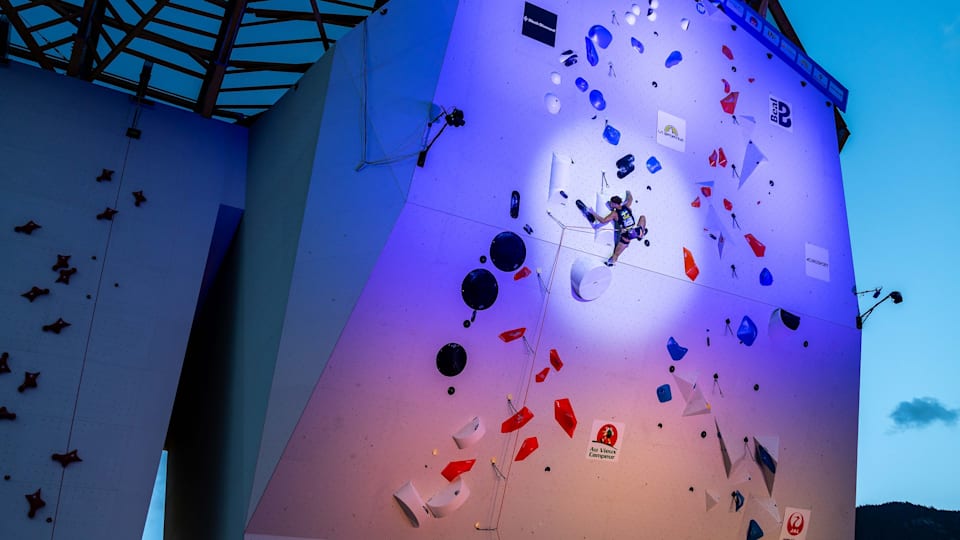Olympic Qualifier Series 2024: The evolution of sport climbing
Sport climbing is one of four sports that will be part of the inaugural Olympic Qualifier Series in 2024. Discover the history and evolution of the sport, from its early days through to its Olympic debut at Tokyo 2020 and the present.

Sport climbing's Olympic Games Paris 2024 qualification pathway is coming to an end.
Just the inaugural Olympic Qualifier Series, in Shanghai from 16-19 May and Budapest from 20-23 June, remain as the final qualifying events for athletes to obtain a quota spot for the Games. You can stream all the action live globally on Olympic Channel via Olympics.com and the official Olympics app for mobile devices.
The sport has come a long way since the first climbing competitions were held in the 1980s and its first World Championships in 1991.
Olympics.com takes a brief look at the history of sport climbing and its evolution into one of the most exciting urban sports at the Olympic Games.
As National Olympic Committees have the exclusive authority for the representation of their respective teams at the Olympic Games, athletes' participation at Paris 2024 depends on their NOC selecting them to represent their delegation. Click here to view the qualification system for each sport.
Brief history of sport climbing
Sport climbing is a sport that originates from traditional rock climbing, which is believed to have started as a recreational activity around the end of the 19th century.
In 1985, competitive climbing began in Bardonecchia, Italy, in the Alps on the border with France, with an event known as SportRoccia, which would be held three more times before the 1990s. In 1986, the first competitions held on artificial climbing walls, rather than natural rock formations, took place near Lyon in France.
The Climbing World Cup began in 1989, a year after a World Series was introduced. Around the same time, the International Climbing and Mountaineering Federation took over the running of the sport, and in the early 1990s a decision was taken to only hold international competitive sport climbing events on purpose-built climbing structures so as to protect natural landscapes.
A World Championships was first held in 1991, followed by the inaugural Youth World Championships in 1992. Within the International Climbing and Mountaineering Federation, competitive sport climbing gained its own rules body known as the International Council for Competition Climbing in 1997. This was replaced a decade later by the International Federation of Sport Climbing (IFSC), the present governing body of the sport.
The federation was provisionally recognised by the International Olympic Committee (IOC) in 2007, with full recognition following in 2010. The sport appeared on the Olympic programme for the first time at Tokyo 2020.
Development of the Sport Climbing World Championships
Three years after the development of a climbing World Series and two years after the first Climbing World Cup, the inaugural Climbing World Championships were held in Frankfurt, Germany, in 1991, with competitions in lead climbing and speed climbing. They were to be held every two years.
Innsbruck, Austria; Geneva, Switzerland; Paris, France; and Birmingham, Great Britain hosted the next four World Championships with only lead and speed competitions at each. In that time, the size of the Championships had grown from 110 to 180 athletes.
Boulder climbing had been officially approved as the third discipline of sport climbing in 1998, with the first World Cup events in bouldering in 1999. In 2001, the discipline was added to the World Championships in Winterthur, Switzerland.
After 2011, the Championships were moved to even-numbered years so as to avoid a clash with the World Games, at which sport climbing had featured since 2005 and were to be held again in 2013. At the 2012 World Championships in Paris, the combined event – which brought all three disciplines of lead, boulder, and speed together – was contested for the first time. Para-climbing was also added to the official World Championship programme around the same time, with its debut in 2011.
The Championships were moved back to odd years - beginning with 2019 in Hachioji, Japan - after sport climbing's addition to the Olympic programme. Now, every other Championships – the ones held in years immediately before the Olympics – serves as an Olympic qualifier.
The 2023 World Championships in Bern, Switzerland, saw the Combined event change its name and format from a lead, boulder, and speed event to a refreshed "Boulder and Lead" event. That was after speed climbing was granted its own separate event at the Olympic Games.
Sport climbing at the Olympic Games
Even before its eventual debut at Tokyo 2020, sport climbing had long held intentions of eventually joining the Olympic programme.
After the IFSC's recognition by the IOC in 2010, it continued to develop the sport, and was rewarded in 2015 when the Tokyo 2020 Organising Committee first proposed it as one of its additional sports under a new pathway, introduced in Agenda 2020.
The IOC Executive Board supported the proposal, which was then approved by the IOC Session held during the Rio 2016 Olympic Games – sport climbing would appear at Tokyo 2020 with two events, men's combined and women's combined.
And, even before it made its debut at the rescheduled Olympic Games Tokyo 2020 held in 2021, the sport's place for Paris 2024 was already confirmed, with the IOC confirming it as an additional sport in December 2020.
In Paris, there will be two new events, as speed climbing has been split from the combined event.
Looking beyond Paris 2024, the sport's place on the Olympic programme is secure for Los Angeles 2028. It was included on LA28's Initial Sports Programme, the core list of sports for the Games, in February 2022.

